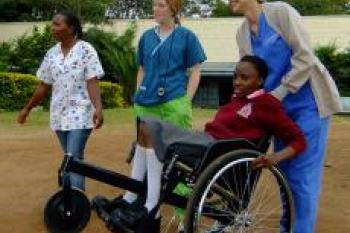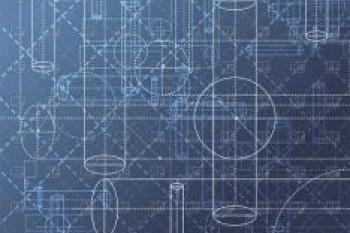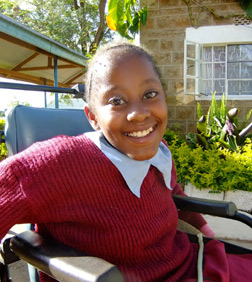- Submitted by Phil Rispin
The other day I read an article about how being thankful actually changes the way your brain works, and the emotion of gratitude is closely correlated with happiness. There are in fact, measurable health benefits if you live with an attitude of gratitude. Here’s a link to just one of many articles. http://ccn.aacnjournals.org/content/29/6/12.short It’s interesting that Judaeo-Christian tradition confirms the central importance of gratitude to psychosocial, physical and spiritual health – see Psalm 107:1, Romans 1:21 and I Thessalonians 5:18.
- Submitted by Phil Rispin
Helplessness and lack of knowledge can have harsh consequences. Avoidable pain and harm happen. For example, children with cerebral palsy often develop contractures and pressure ulcers that could be avoidable with a little training. Contractures and ulcers often severely limit mobility and health. The ulcers can be fatal if an infection occurs. Parents often feel very isolated and alone, unconnected with anyone with similar challenges.
- Submitted by Phil Rispin
May 15th, 2019
In the Canada I grew up in learning to be self-sufficient, taking on responsibility as I gr ew, was a major part of my life. Dad was always eager to give us more responsibility around our home as was my mother. Both my parents worked hard to provide for us, and it was only fair that we pitch in as we were able. One of the resources my mother brought to the table was wisdom. She was adamant that I save money instead of spending it. As a result, by the time I was University age I had a bank account with enough money for my first year of college. I managed to work my way through my undergraduate degree and my master’s degree leaving only a $2000.00 debt for my formal education. At the time I felt pretty good about being self-sufficient and there was a certain amount of young man’s arrogance involved.
ew, was a major part of my life. Dad was always eager to give us more responsibility around our home as was my mother. Both my parents worked hard to provide for us, and it was only fair that we pitch in as we were able. One of the resources my mother brought to the table was wisdom. She was adamant that I save money instead of spending it. As a result, by the time I was University age I had a bank account with enough money for my first year of college. I managed to work my way through my undergraduate degree and my master’s degree leaving only a $2000.00 debt for my formal education. At the time I felt pretty good about being self-sufficient and there was a certain amount of young man’s arrogance involved.
- Submitted by Phil Rispin
A primary goal of AT Catalyst’s is to bring wheelchair resources together with those that need them. Some facets of that goal include enabling affordable and appropriate wheelchair supplies, facilitating training, and finding affordable ways to seat those with complex postural problems. Success opens doors for collaboration between wheelchair specialists, and facilitation of ways to share real hope with those who receive the wheelchairs.
- Submitted by Phil Rispin
I guess I should thank my 6th-grade teacher Mr. Bishop for sending me to the back of the schoolroom for some altercation or another (he and I did not get along) because it was there that I discovered I couldn’t see. First, I thought it was a deliberate attempt by Mr. Bishop to sabotage my education as I couldn’t read what he was putting on the blackboard from the frontier regions of the classroom. I relayed this information to my mother who was very wise, and she promptly took me to an eye doctor. To her credit, she didn’t ask why I had been sent to the back of the school room in the first place. The doctor was able to determine that I was myopic and needed glasses.
- Submitted by Phil Rispin
Like many fathers, my dad had favorite short sayings that he used regularly when trying to guide or discipline his sons.
Dad would often assign us tasks or chores that had varying levels of complexity.  When we seemed a little confused about how to get started or understand the exact nature of what he wanted from us he would inevitably say, with a hint of irritation, “do I need to draw you a blueprint?"
When we seemed a little confused about how to get started or understand the exact nature of what he wanted from us he would inevitably say, with a hint of irritation, “do I need to draw you a blueprint?"
I used to think that it would be a good thing if we came equipped with our own personal blueprint to guide us through life starting at “A” progressing to “B” fulfilling the things that we were supposed to be doing here on earth. It would make a lot of stuff easier. Questions like who to marry, what we should pursue as a vocation, whether or not to have children and a host of other things would become straight forward; just follow the blueprint.
- Submitted by Phil Rispin
Drug users often describe the feeling they get from recreational drug use as a “rush”. I had a rush this week when Karen forwarded me the note below.
Solomon is a Physio-Therapist from Kenya that Karen has interacted with. Though I have yet to meet him I have listened to him and recognize his passion to help disabled children. In fact, from what I have been told he has taken the parable found in Luke 14:15-24 literally, particularly verse 21. Solomon actively seeks out children with disabilities and helps them as best he can with the resources he has.
Karen connected Tenwek Hospital with Free Wheelchair Mission and the first container has arrived. The words below are Solomon’s.
“First free mission wheelchair, pilot distribution on 13 yr old girl”
- Submitted by Phil Rispin
2018 was a big year for us. We can look back on about a half a year’s work full time on the AT Catalyst project. It started with taking a big leap, leaving our jobs at LeTourneau and selling our house. Then there was a long trip to present the project to great people in Texas, Tennessee, Illinois, Kansas, Colorado, Wyoming, Montana and finally Alberta. That loop included interactions with Samaritan’s Purse and being part of a great conference with IDEAS. In September and October, we set up our new home base in Alberta. We were back on the road in November to the Global Missions Health Conference and meetings with the Christian Medical and Dental Association. Then in November, Karen was off to Egypt leading a group to interact with two faith-based hospitals there. On the way home, in the UK she was able to meet with researchers at the Global Disability Innovation Hub. God is doing amazing things. Many thanks to all of you who made this possible!! Stay posted for more great doors opening in 2019.
- Submitted by Phil Rispin
For many of us, Christmas is a time of family and good food. There’s a story about a celebration meal in Luke 14. In verse 21 we read ‘Go out quickly into the streets and alleys of the town and bring in the poor, the crippled, the blind and the lame.’ Until Karen began working with disabled children in Kenya, I hadn't given much thought as to how difficult it might be to do this.
- Submitted by Phil Rispin
There is a saying that you may have heard, it goes “How do you eat an elephant?” The answer: “One bite at a time”. This helps to describe the huge need for safe and affordable healthcare that is absent for a very large proportion of the world’s population.
Karen and I spent most of last week at a conference that brought thousands of healthcare providers together most of whom work in the developing world working hard to alleviate that problem. Every type of medicine was represented, from neurosurgery to physical therapy, ophthalmology to assistive technology, dentistry to plastic surgery. These folks either work full time in a culture that is not their own or they donate weeks of their time every year to go somewhere in the world and help.

 Visit us on Facebook
Visit us on Facebook